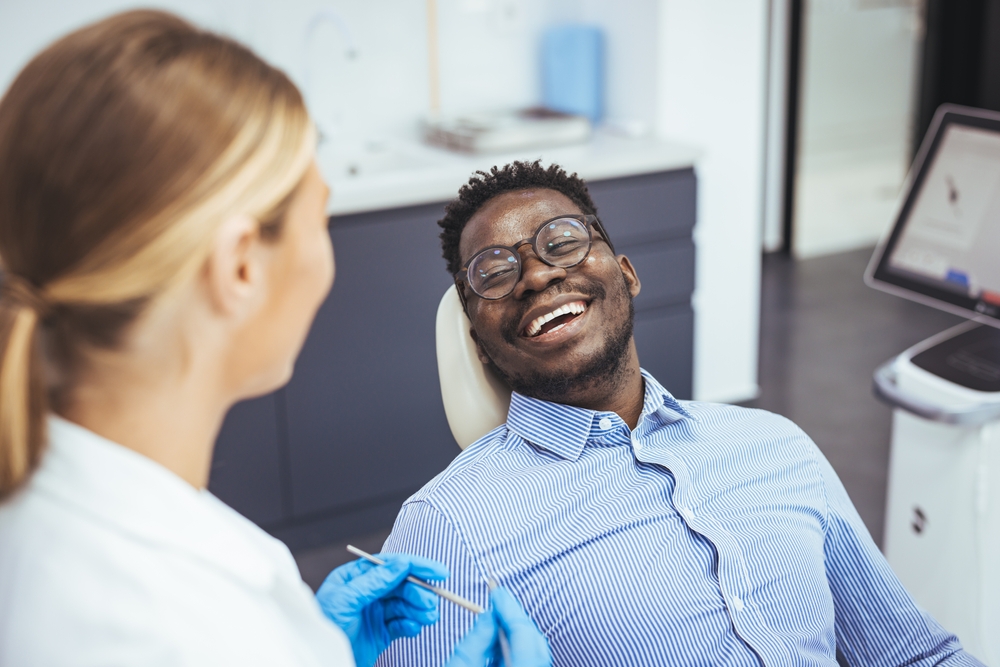

The Importance of Yearly Oral Cancer Screenings
Oral cancer is a deadly disease that affects many, taking thousands of lives each year. But when detected early, it has an 80 to 90% survival rate! Our Staten Island dentists delve into the life-saving benefits of oral cancer screenings and how they act as powerful tools in prevention and early detection.
Let’s equip ourselves with knowledge to fight back, because every second counts when it comes to oral cancer!
What Is Oral Cancer?
Oral cancer refers to cancers that develop in any part of the oral cavity or oropharynx. The oral cavity includes the lips, the front two-thirds of the tongue, the gums, the lining inside the cheeks and lips, the bottom of the mouth under the tongue, the hard palate (roof of the mouth), and the small area behind the wisdom teeth. The oropharynx includes the back third of the tongue, the tonsils, the soft palate, and the part of the throat behind the mouth.
Identifying Oral Cancer
Identifying oral cancer requires vigilance and awareness of its potential signs and symptoms. One common indicator is the presence of persistent sores or ulcers that don’t heal within two weeks. These sores may cause discomfort or pain, potentially accompanied by difficulty in swallowing or speaking. Additionally, any unexplained bleeding in the mouth or sudden changes in the voice shouldn’t be ignored.
Dentists perform thorough examinations during routine dental visits to assess any abnormalities in the mouth. They carefully inspect the teeth, gums, tongue, lips, cheeks, throat, neck, and underlying tissues for any signs that may indicate the presence of oral cancer or precancerous conditions.
It’s important to remember that only a healthcare professional can provide an accurate diagnosis based on a comprehensive evaluation that considers multiple factors.
Why Oral Cancer Screenings Are Crucial
Early detection is key when it comes to oral cancer, and that’s where oral cancer screenings play a crucial role. These screenings are examinations performed by dentists or doctors to look for signs of cancer or pre-cancerous conditions in the mouth. The goal is early detection, as it significantly increases the chances of successful treatment and cure. While some may question the necessity of these screenings, their importance cannot be overstated.
Oral cancer screenings are typically conducted during routine dental cleaning appointments, often without patients even realizing it. The dentist examines the mouth, looking for any abnormal changes in the tissues, such as lumps, sores, white or red patches, or other suspicious areas. They also check the lymph nodes in the neck and jaw for any signs of swelling or tenderness.
However, while oral cancer screenings can aid in detecting potential issues in the mouth, they aren’t definitive diagnostic tools. If any abnormalities are found during a screening, follow-up visits or biopsies may be recommended to further evaluate suspicious areas. Think of an oral cancer screening as a first glance at a puzzle — while it provides valuable initial information, additional pieces may be needed to complete the picture.
 Risks and Consequences of Late Diagnosis
Risks and Consequences of Late Diagnosis
Late diagnosis of oral cancer can have serious implications for an individual’s health and well-being. When oral cancer is detected at later stages, treatment options become more limited, and the chances of a full recovery diminish significantly. It’s essential to be aware of the risks associated with late diagnosis to fully appreciate the importance of regular screenings.
Late diagnosis not only affects the success rates of treatment but also impacts overall quality of life. Advanced-stage oral cancer can result in disfigurement, difficulty speaking or swallowing, loss of taste or sense of smell, and even death in severe cases. Cancer that has spread beyond the mouth can be more challenging to treat effectively and may require extensive surgeries or other interventions.
Additionally, certain risk factors increase the likelihood of developing oral cancer. These include:
- Tobacco use (including smoking and smokeless tobacco)
- Heavy alcohol consumption
- Previous history of oral cancer
- Significant sun exposure (for lip cancer)
- Infection with certain types of human papillomavirus (HPV)
Regular screenings are particularly crucial for individuals with these risk factors or a personal history of oral cancer.
The Process of Oral Cancer Screenings
Regular oral cancer screenings play a vital role in detecting abnormalities and potentially life-threatening conditions in their early stages. Typically, an oral cancer screening begins with a comprehensive examination performed by a healthcare professional, such as a dentist or oral surgeon.
During this examination, the healthcare professional will carefully inspect every part of your mouth, including your lips, gums, tongue, cheeks, and the roof and floor of your mouth. They’ll look for any visible signs or symptoms that could indicate the presence of oral cancer or precancerous lesions.
These signs may include:
- Red or white patches
- Ulcers
- Lumps
- Unusual changes in tissue texture
Visual inspection is just one aspect of an oral cancer screening. In some cases, additional tests may be performed to further assess any suspicious areas. They may also use specialized tools such as a lighted mirror or intraoral camera to get a closer look at certain areas.
Depending on any initial findings or specific concerns, additional tests may be recommended to provide a more accurate diagnosis. These tests could include tissue sampling (biopsy), imaging tests such as X-rays or CT scans, or referral to a specialist for further evaluation.
Benefits of Regular Oral Cancer Screenings
Regular oral cancer screenings offer numerous benefits when it comes to maintaining oral health. These screenings play a pivotal role in the prevention and early detection of oral cancer.
Early Detection
Oral cancer, like any other form of cancer, is most treatable and has the highest chance of successful recovery when diagnosed in its early stages. With routine screenings, potential symptoms or suspicious areas can be identified early on, allowing for prompt intervention and treatment.
Potential Reduction in Treatment Costs
Detecting oral cancer at an advanced stage often requires more extensive treatment procedures such as surgery, radiation therapy, or chemotherapy. These treatments can be not only physically taxing but also financially burdensome. If oral cancer is caught early through regular screenings, less aggressive and costly interventions may be sufficient. Such early intervention can significantly reduce the financial strain associated with oral cancer treatment.
Lifestyle Modifications
There are certain lifestyle modifications to discuss that can help reduce the risk of developing this serious disease. Dental professionals often take the opportunity during these appointments to educate patients about the harmful effects of tobacco use, excessive alcohol consumption, and other lifestyle factors that contribute to oral cancer. By addressing these risk factors early on, individuals can make informed decisions about their habits and take necessary steps to reduce their vulnerability to oral cancer.
Schedule Your Appointment Today!
Oral cancer screenings don’t need to be their own appointment. You can receive your yearly oral cancer screening at your next dental cleaning visit. To schedule an appointment with our Staten Island dentists, call our dental office at (718) 948-5111 today.


 Risks and Consequences of Late Diagnosis
Risks and Consequences of Late Diagnosis